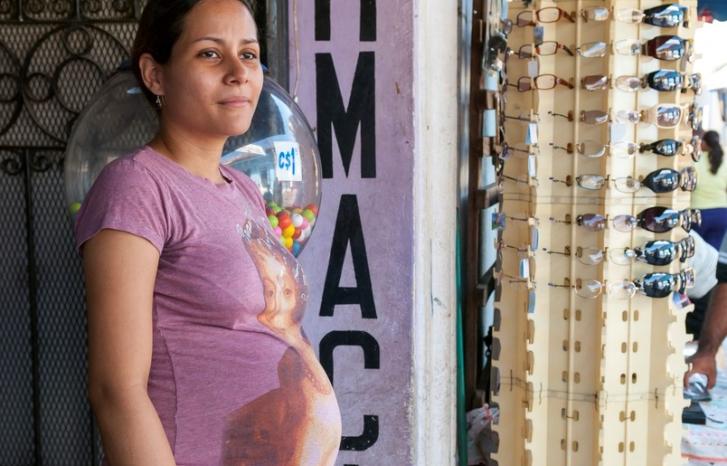Sunniva Rivedal has won STK’s award for the best master’s thesis with a gender perspective submitted to the University of Oslo (UiO) in 2020. The thesis explores the embodied experiences of working mothers. Maurice Merleau-Ponty’s phenomenology of embodiment forms the theoretical framework of the thesis, while the empirical material consists of in-depth interviews with nine working mothers, each of whom have two children in kindergarten. The interviews focus on their everyday experiences of working and caring for young children.
The maternal body lies at the centre of Rivedal’s analyses. Using the term sensitized embodiment [sensitivert kroppslighet], Rivedal shows that the mothers often experience their own bodies as limitless. She argues that the "openness" of the maternal body is helpful, in that it allows mothers to be sensitive to the needs of their children, yet it can also cause stress and exhaustion. Rivedal submitted her thesis in the spring of 2020 as part of her master’s degree in Interdisciplinary Health Sciences at the Institute for Health and Society, UiO.
Both the nomination and the jury’s assessment emphasize the originality of Rivedal’s theoretical approach to the empirical material. The jury writes that Rivedal’s “consistent and nuanced analysis of the lived body makes it possible for her to move beyond dualistic thinking and to provide new ways of thinking about experience, care, health, and gender”. They conclude that her thesis has the potential to develop new understandings within women’s mental and physical health.

The missing body
When it came to choosing a topic for her thesis, Rivedal was inspired by her own experiences of motherhood:
–I knew that it would be challenging to have young children, but I wasn’t quite prepared for the reality of what it was like. I also wasn’t prepared for the effect it had on the relationship between my husband and I, and how we would relate to one another as parents.
Although there were debates in the media regarding women doing more care work than their male partners, Rivedal had a sense that something was missing from these discussions. She had the same feeling when she became a full-time student again:
–I attended a lecture on theory and theory development within health sciences. The lecturer used various examples of theories, one of which was Catherine Hakim’s theory that basically argues that women can now choose how they balance their career and their care responsibilities. That theory really annoyed me – it seemed too simplistic. When I read work by other sociologists, I learned that many researchers had disagreed with this theory, and had argued that free choice needs to be understood within the context of societal structures and norms regarding motherhood. While I was happy that this had been pointed out, I still felt that something was missing.
The light bulb moment came when Rivedal had the opportunity to delve into the work of philosopher Maurice Merleau-Ponty. She found Merleau-Ponty’s focus on embodied consciousness and his opposition to dualist ontologies particularly useful.
–It took a long time to really understand Merleau-Ponty, and it was both hugely demanding and incredibly rewarding. This made it possible for me to open up new perspectives, and most importantly of all, it gave me a language that I could use to explore. I understood that I wanted to focus on the embodied and often unspoken experiences that occur when you are juggling work and caring for young children.
–Where was the body in all these discussions about norms, structures, and free choice? The body is so present during pregnancy and birth, even though it is often understood in purely physiological and biological terms. But afterwards, when you’re a mother and you’ve returned to working life, the body disappears, and everything is supposed to be equal.
The maternal body as useful and troublesome
–What do you regard as your most important findings?
–That what I call “sensitized embodiment” is a central part of the experiences that the mothers have in relation to caring for their children and being present with them. At the same time, this sensitized embodiment is troublesome, because it means that stress and worry can manifest physically while you are at work. You might get a stomachache because you’re worried about something, or you might lie awake at night, even though you’re exhausted. The mothers tended to wake up before the fathers. The mums frequently said that they could nudge the dad, and he would wake up and go and tend to the child, but she was the one who was already awake. In other words, there were significant differences between the sexes.
Even though the mothers that Rivedal spoke to recognized these gendered differences, she says that they often viewed their struggles as a personal problem. Many of the couples, and the mothers in particular, put a lot of energy into trying to share care work equally, for instance by taking turns putting the children to bed. Yet it was difficult to make things completely equal:
–Some say that when they had a second child, they gave up on “taking turns”. The mum ends up putting the kids to bed, because that ensures that they actually go to sleep.
Rivedal explains that the openness of the maternal body means that the mothers have difficulty calming down. It is difficult to find time to rest when your body is always on standby, and you are also expected to perform at work.
She argues that media narratives about mothers doing too much because they are "perfectionists" lacks an awareness of the openness of the maternal body:
–This is a new dimension that shows that vulnerability can take a physical and mental toll in ways that we have failed to recognize previously.
Rivedal also points out that her findings can have implications for working life, especially for women who work within the care sector, where you also need to have an “open” body and to take in the feelings and needs of other people. Using a phenomenology of the body makes it possible to break with the dualistic understanding of mind and body as separate entities. This in turn means that psychological diagnoses like anxiety or depression can be understood within the context of the exhausted body:
–When we fail to recognize the role that the body plays, some people end up pushing themselves too far.
Wants to continue researching maternal embodiment
–What are your plans for the future?
–I hope that I will be able to take a PhD within this topic. Initially, I was motivated by my interest in the experiences of the mothers of young children. After a while, I became so interested in the phenomenology of the body that I felt I was willing to do research on almost any subject matter, so long as I was able to use this theoretical approach. Of course, what I would like most of all is to continue working on the same topic, so that is what I’m trying to do now, with excellent help from the Department for Interdisciplinary Health Sciences at UiO.
Rivedal emphasizes that although she is motivated by her own interest in her research topic, she feels that the themes and perspectives that she explores in her thesis deserve more attention:
–I don’t want this to be just another master’s thesis, gathering dust. I want this topic to be discussed!
This article was first published on Centre for Gender Research's website stk.uio.no.
Title: Sensitivized embodiment – A qualitative study of the care experiences and health of working mothers of young children [Sensitivert kroppslighet - En kvalitativ studie av yrkesaktive småbarnsmødres omsorgserfaringer og helse]
Submitted to: Institute of Health and Society (HELSAM), University of Oslo (UiO)
Nominated by: Supervisor Gunvor Aasbø (HELSAM) and external examiner Karen Synne Groven (OsloMet)
Jury: Helene Aarseth, Reinert Skumsnes and Hilde Bondevik



